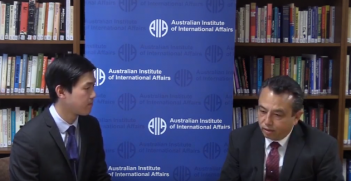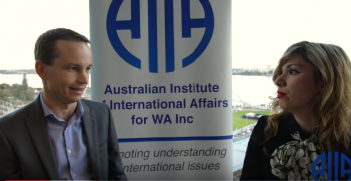Evolving ANZUS

In an interview conducted at the end of his extended posting as Australian ambassador to the United States, Kim Beazley told Fergus Hanson that Australia punches above its weight in the alliance but may soon need to provide more military heft; and when it comes to Australia-US-China relations, Washington’s insights into how Beijing works are a long way ahead of anything available in Canberra.
Hanson: Broadly, how would you characterise Australia-United States relations during the ANZUS era?
Beazley: Weak theories of history suggest a straight line of progress in an upwards direction, leading to a conclusion at the end point which satisfies the liberal and democratic mind. It doesn’t apply. It doesn’t apply to anything, and it doesn’t apply to this. In many ways, the ANZUS relationship is a circular thing. It waxes and wanes. It’s generally determined to some extent, obviously, by what is the character of international politics at that point. And it’s changed its characteristics, evolving both with the different geopolitical circumstances, with different technological capabilities, and with different characteristics in relationships between Australia and other allies. It’s been a rich, movable feast.
Hanson: Every state vies for attention in Washington. The concrete outcomes that have been achieved by Australia suggest we do better than most. Would you agree with that assessment and, if so, what has been the key to achieving this? Would you say that there is a special intimacy that distinguishes the relationship?
Beazley: Look, I think this has varied over time. The hard thing is to get down and calculate those variations. In many ways, I don’t think we bat as effectively as we did in the 1950s or, if we are, we’re just catching up with where we were. In the 1950s, we were a big deal around this town [Washington DC]. The Secretary of State would turn up two or three times a year for dinner at the Australian Embassy. The Queen, when she came across here would come, not all the time obviously, but once or twice would come and visit the Australian Embassy.
Where we are now is vastly more influential with the United States than we’ve ever been in terms of punching above our weight. Whereas we punched above our weight outside the alliance context in the 80s, we now have to do it inside the alliance context. The price we have to pay to be able to do that effectively is much, much higher than simply providing the Americans with a flag.
We’ve gotten used to the idea, perhaps since that tanker war, when we put in a few divers, and to a degree the Iraq and Afghanistan wars, where we provided a useful niche, of not providing real heft. We haven’t really provided heft since World War II. We were big contributors to MacArthur’s command. We were big in the fight with the Japanese in New Guinea and the islands. We were a big element of the spear of the British army in 1918. We’ve never really matched those strategically or militarily.
We may be approaching that now in Iraq though. We’re the second biggest contributor and, per capita, a much heavier contributor than the Americans. We’ll see. This is going to be a long war if it doesn’t go completely foul. We may be at another sort of sea-change point at the moment.
Hanson: Moving now to the future challenges we face in our diplomatic efforts, how do you see Australia balancing the rise of China and our long-term alliance with the United States, in particular how are both sides of Australian politics likely to respond?
Beazley: We intellectualise it too much. We worry about it like a dog with a bone. We worry with incomplete perspectives and information. The Americans know much more about China than we do. Their relationship with China is much more intimate than ours. I mean by that, across the board. They have people in their think tanks here who routinely, four or five times a year, turn up in China and chat away to senior Chinese leadership past and present. There’s only one Australian who does that and that’s Kevin Rudd. Nobody else has that level of access in Australia, but we do pontificate on it.
The Americans actually know, and they know which questions to ask. It was also pointed out to me that, “Really you fellows don’t deal with the Chinese. You sell them things that they want.” The easiest point of intersection with the Chinese is when you sell them things that they want. The hardest point of intersection is when you’re telling them that you’re going to be in their market. If they want the access that they’ve got to the United States that’s so vital to their prosperity, you want a decent investment policy there. They still haven’t got an investment agreement with the Chinese, but the Americans are belting the Chinese around to get one.
We have two-dimensional agreements, like the Free Trade Agreement. The Americans want an investment agreement that protects their IP and lets them get profit out of there and doesn’t have their firm stolen from or simply overtaken without compensation, which is a bad Chinese habit. We don’t have a dealing with the Chinese at bad habit level, or very little of it. The Americans deal with China at all aspects of the bad habit level.
We get a bit surprised when there’s a cyber-attack on the Parliamentary system or something like that. We tend to be a bit reserved about expressing our disagreements. When the Americans experience it, which they frequently do, they kick the Chinese right up the bum. It’s a problem of discussion at the moment. The Americans have levelled charges at five Chinese spies for one set of computer outrages. We hang back. We are timid. We’re quite timid in the face of China. We also know the Americans know more than we do, that yes, we are not really a frontline state with China like the states in the South China Sea. We’re a second tier state. We have a level of safety. If we want to exert the space, we can. We have a base realisation of that. That permits us to not completely collapse in the face of Chinese pressures and to incorporate into our discussions with China that we have a relationship with the Americans that goes way back. Generally speaking, it’s been quite copacetic with Chinese interests.
You’re into something important here. This is a real worry. In a sense it’s a fake debate. Sometimes you can have too much of a debate. Sometimes you have to say, “Listen. What our objective is, is to maintain a reasonable relationship with China and a strong relationship with the United States”. Quite frankly, this is not a matter of choice. It’s a matter of common sense. You just get on with it. Stop asking the question. Do the job. You have to get to that sort of sentiment.
The Hon Kim Beazley AC FAIIA is the national president of the Australian Institute of International Affairs and former Australian ambassador to the United States. He is a former politician and has served as minister for defence, deputy prime minister of Australia, leader of the Labor Party and opposition leader.
Fergus Hanson is executive vice president of the Global Fund to End Slavery and non-resident fellow at the Brookings Institution.
This is an excerpt of an extended interview. The full transcript is available here.





